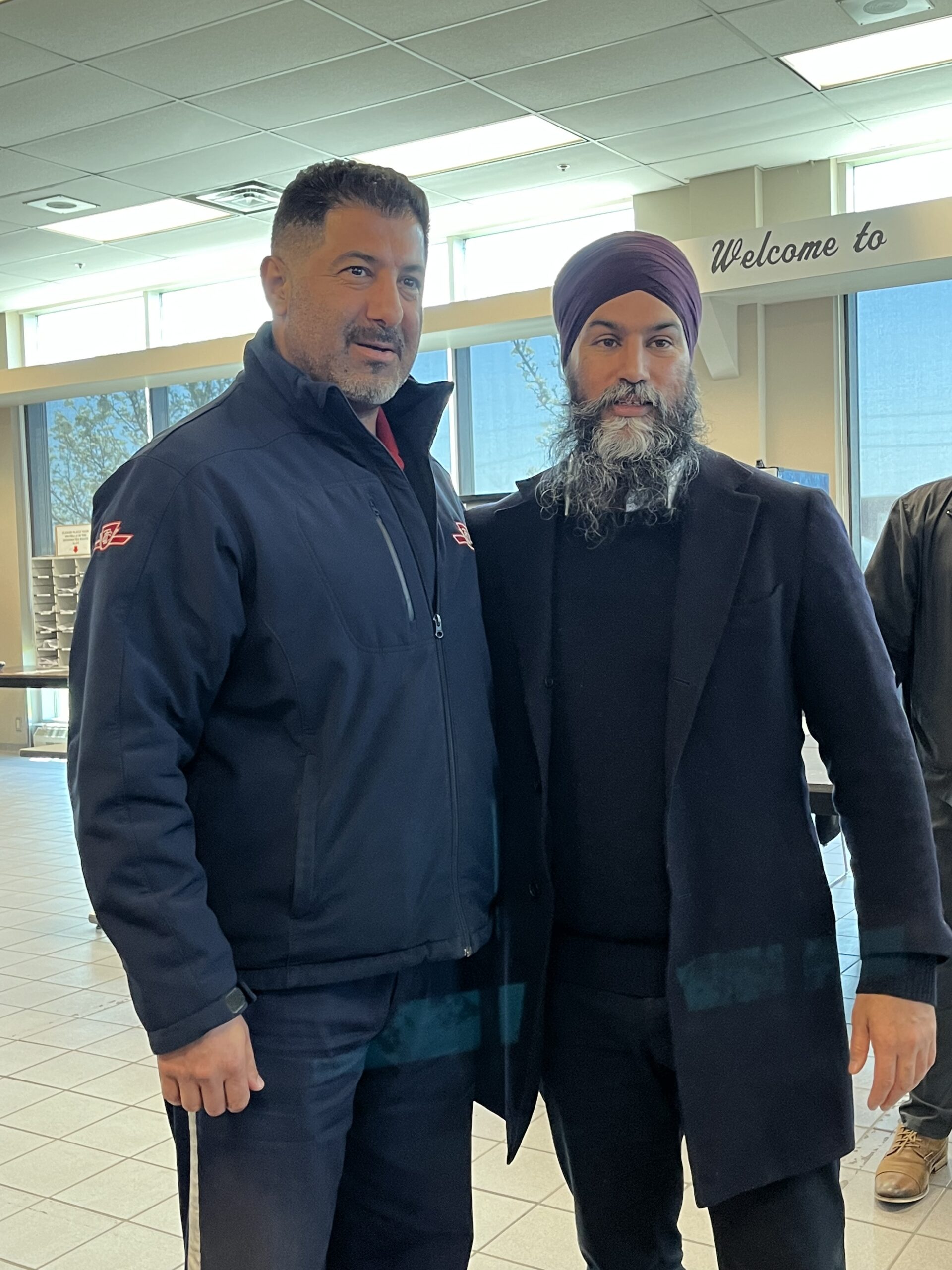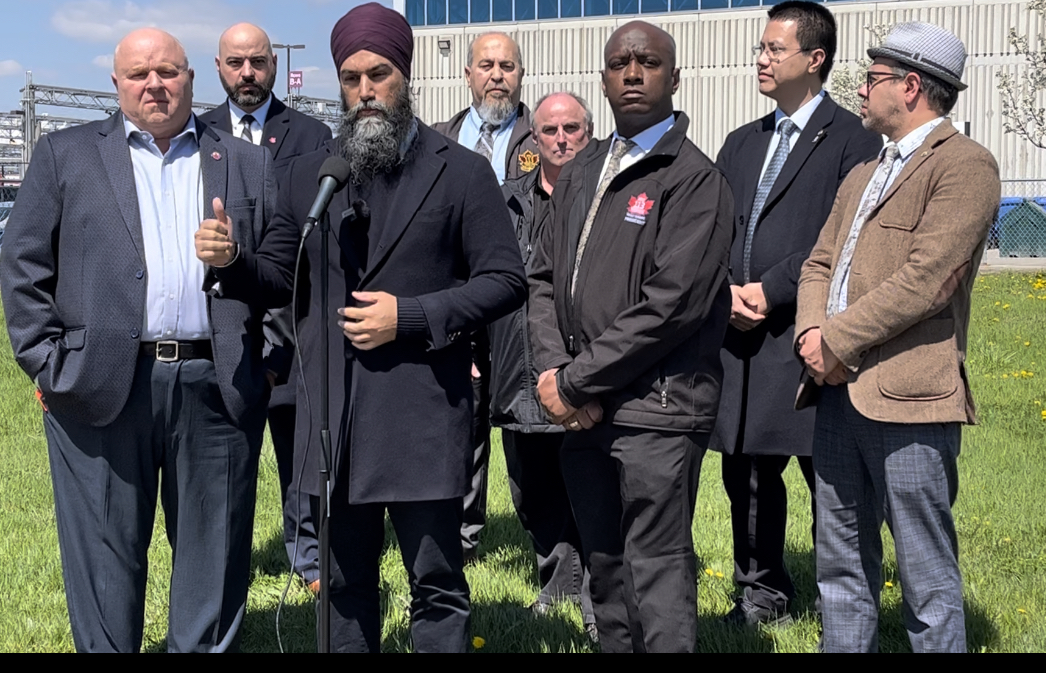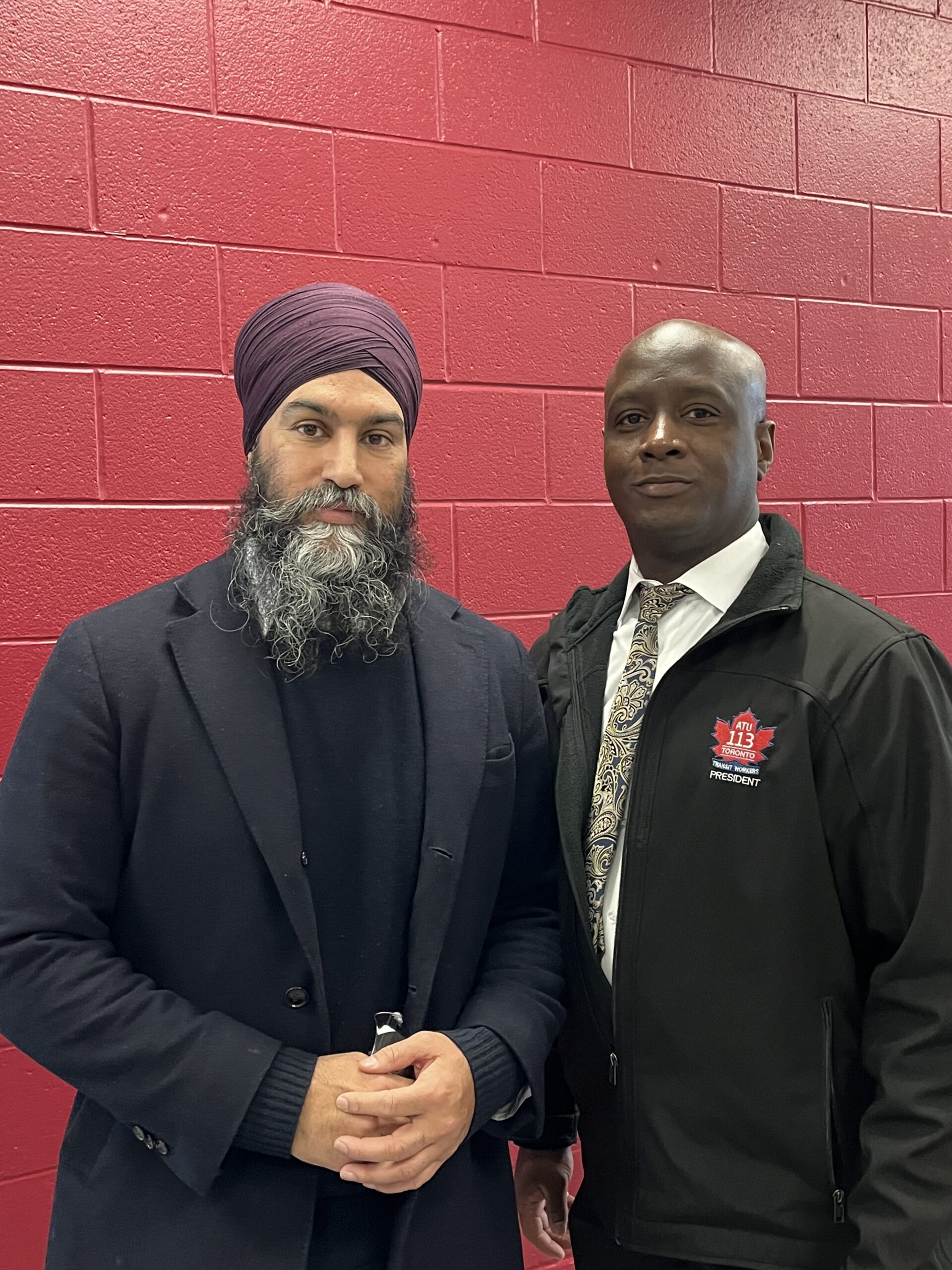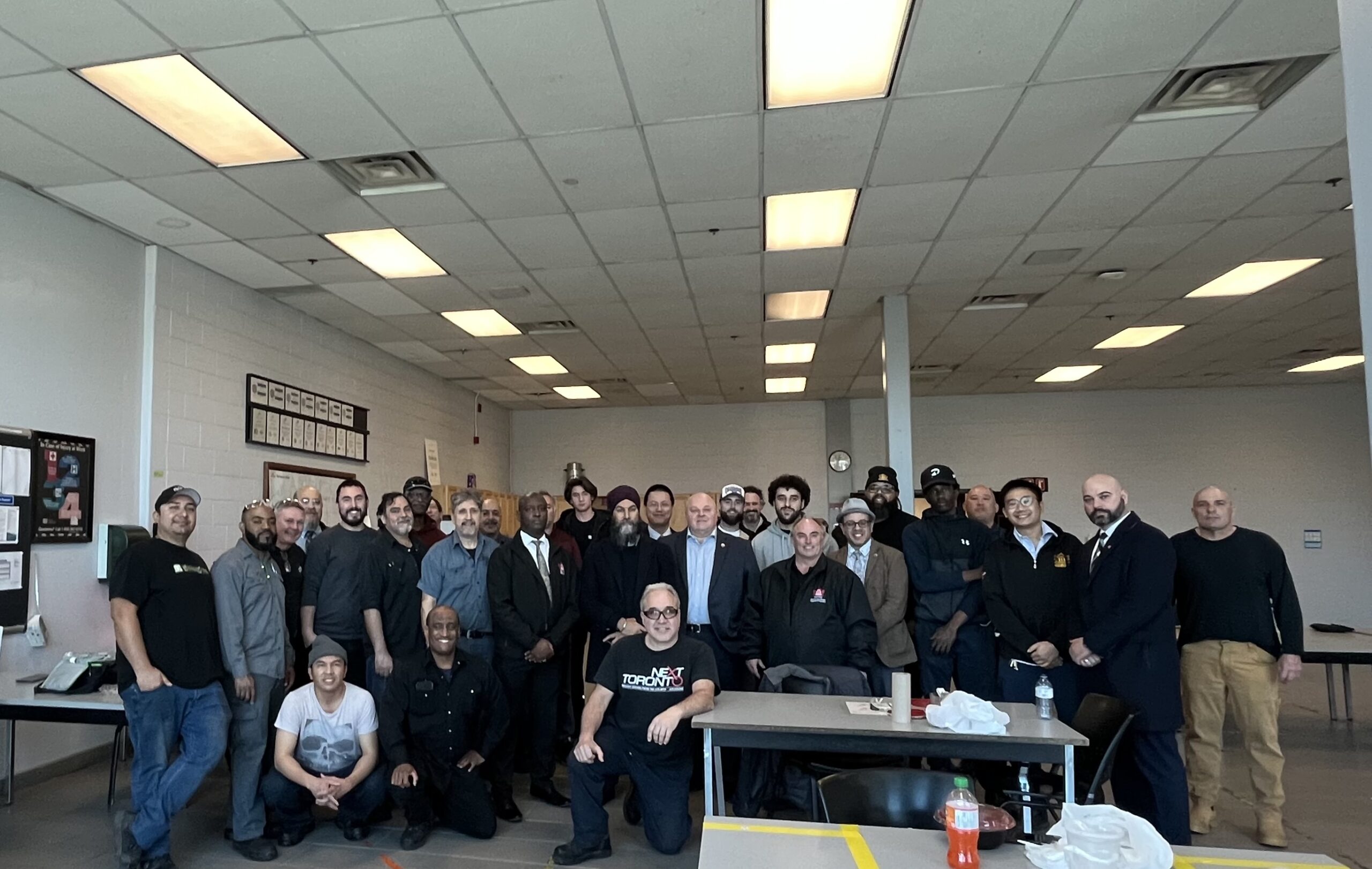ATU Local 113 is proud to support Olivia Chow in her campaign for mayor. We believe that Olivia is the only candidate who will stand up for public transit workers and make the TTC a better place for riders.
ATU Local 113 has proudly endorsed Olivia Chow for Mayor
ATU Local 113 has proudly endorsed Olivia Chow for mayor.
“This election is a once-in-a-generation chance to change course and restore the TTC. ATU Local 113 is endorsing Olivia Chow because she is the only candidate who has the proven history of success in defending public services.”
CITY ISSUES: The latest from some of Toronto’s top mayor candidates | Toronto Sun
ATU Local 113’s Annual Pensioners’ Party
Amalgamated Transit Union International and ATU Local 113 are celebrating a huge legal victory for workers
TORONTO — Yesterday, the Ontario Superior Court struck down legislation illegally limiting collective bargaining for over 12,000 TTC workers. The legislation, in place since 2011, has been found to be unconstitutional and a violation of workers’ right to free association that is fundamental to a democracy. This is a comprehensive and decisive victory for transit workers and will have an impact across Canada.
“This is a monumental victory for our Local 113, our members, and our union. Strikes aren’t just about workers fighting for their rights and benefits, they’re a powerful tool to demand justice and fairness and inspire social change,” said ATU International President John Costa. “Strikes remind us that the value of labour can’t be measured by profits alone, but by the dignity and well-being of those who do the work. Congratulations to ATU Local 113!”
Before the decision, TTC workers were the only transit workers in Canada who were banned from striking. Without an incentive to negotiate, we have been unable to resolve big issues in the workplace, modernize the TTC, or update the collective agreement. As of today, ATU Local 113 members will be able to bargain their next collective agreement free from the infringement on their Charter rights.
“This is an historic win for transit workers in Canada. The Court has delivered a major victory for free collective bargaining in Ontario and for our Local,” said President Marvin Alfred, on behalf of the Executive Board of ATU Local 113. “Our members’ Charter rights have been violated for more than a decade. We’ve known for more than ten years that Local 113’s rights were being violated, and that the TTC had been given an unfair advantage in bargaining. Fortunately, we are now able to return to the bargaining table without unfair government interference.”
ATU Local 113 went to court seeking to strike down the 2011 TTC Labour Disputes Resolution Act, arguing that it violated its members Charter of Rights and Freedoms right to free association. The Court found that ATU Local 113 had only been on strike for twelve days in the 20 years prior to imposing the legislation.
The Superior Court decision found that:
- The legislation substantially interfered with meaningful collective bargaining, and impaired the union’s ability to bargain freely with the TTC,
- The removal of the right to strike has had a negative effect on the negotiating process,
- Employees have not been on an equal footing with the TTC, and
- The approach taken by TTC negotiators after the legislation was adopted is “particularly troubling”, with negotiators becoming “more confrontational and aggressive.
ATU Local 113 Statement on TTC Service Cuts
TORONTO — TTC management needs to take responsibility for service cuts.
The TTC has chosen to cut service even though there are operators ready, willing, and able to perform the work in question. Rather than provide a schedule with regular and reliable service, TTC CEO Rick Leary has chosen to slash service.
“Rick Leary has sought to shift the blame for his service cuts to alleged absenteeism by TTC employees including operators. This is false,” said Marvin Alfred, President of the TTC’s largest union, the Amalgamated Transit Union Local 113. “The TTC has imposed service cuts. These were choices Rick Leary himself made and rubber stamped by the Commissioners and the former Mayor of Toronto.”
In fact, the TTC has always had available vehicles and operators who could be providing additional service. The TTC shifted a large number of operators from scheduled service to sitting in a “spare” pool waiting to be assigned work day-to-day. Instead of cannibalizing the operators’ schedule and assigning work on an ad-hoc basis, the TTC could have and should have, scheduled full service. This ad-hoc approach to service is worse for operators and means worse service for riders.
Leary’s statements are misleading and irresponsible. He appears to be deflecting blame for his service cuts to operators on the front line. It is the front-line workers who have to bear the brunt of public anger over poor service and who are the victims of assaults. This was an irresponsible attempt to shift the blame for these ill-advised service cuts and has the potential to further endanger TTC workers.
“The public expects a frequent scheduled service. TTC workers expect scheduled work to be made available in advance. Cutting service and filling the gaps with a pool of operators with no specific work assignment is poor service as well as contrary to the Collective Agreement between ATU Local 113 and the TTC,” said Marvin Alfred.
“For months, the TTC has artificially inflated its pool of “spare” operators beyond what it needs to cover absences. These workers could and should have been used to provide regular scheduled services. Absenteeism has nothing to do with it. These operators have been available all along, but the TTC chose not to use them for scheduled service.”
The TTC is not being transparent with the public. First, it was refusing to disclose the routes affected by cuts before the budget vote, and now by implying there are too few available operators.
The TTC has the vehicles and the operators available to return to a full-service schedule. The time for that to happen is now.
Historic Decision Confirms TTC Workers’ Right to Strike
Today, Hon. Justice Chalmers of the Ontario Superior Court of Justice found that Ontario legislation banning TTC workers from striking violated the Canadian Charter of Rights and Freedoms. ATU Local 113 is proud to announce that our members have secured the right to strike. To read the full decision, please see the link below:
ATU Local 113 Has Won the Fight to Protect Members Right to Strike
Marvin Alfred, on behalf of the Executive Board of Amalgamated Transit Union Local 113, is proud to announce that today we won our fight to protect members’ right to strike.
In a historic ruling, Hon. Justice Chalmers of the Ontario Superior Court of Justice found that Ontario legislation banning TTC workers from striking violated the Canadian Charter of Rights and Freedoms.
This is a historic and important decision confirming the right to strike for working people. Further, the Court characterized the government’s request to delay the implementation of the decision until after March 31st, 2024, as unreasonable. Effective immediately the legislation is declared unconstitutional and of no force and effect.
Member Recognition: ATU Local 113 congratulates Andrew Falotico on Health and Safety Activist Award
Congratulations to ATU Local 113’s Andrew Falotico on receiving the Toronto/York Region Labour Council’s Health and Safety Activist Awards.
Andrew is the Health and Safety Representative of our local. He supports our 12,000 union members and oversees 54 Joint Health and Safety Committees by providing information and expertise on workplace health and safety.
Andrew has advocated fought for the rights of workers and riders who take the TTC subway system to have clean air. Health Canada recognized the need to have Air Quality guidelines to reduce the exposure of harmful particulate matter.
Most recently, Andrew championed the ATU 113 Violence and Harassment campaign. During the current COVID-19 recovery and transition phase, there has been an increase in incidences of violence and harassment in public spaces, especially on public transit in Toronto. The TTC is in a rapid state of decline – impacted by the inadequate public funding, declining services, a lack of affordable housing, along with many other social and economic problems. Andrew assisted in creating a survey for members of the ATU Local 113 that highlighted violence and harassment in the workplace. Through the results of the survey, he helped bring attention to the key issues, and to identify the necessary controls needed to reduce violence and harassment in the workplace, as well as drawing attention to mental health issues.
Andrew is currently involved with several organizations, including the TTC, in designing the “bus of the future” that will address several safety concerns such as blind spots that contribute to pedestrian fatalities, improved air quality in buses that will minimize and reduce viral transmission of viruses, allow for proper accessibility for patrons who have disabilities, and a proper ergonomic workstation for operators to protect them from aggravated assault and injury.
Congratulations Andrew!
Thank you NDP Leader, Jagmeet Singh for Meeting with ATU Local 113 Members
NDP federal leader, Jagmeet Singh met with ATU Local 113 members yesterday at Eglington Garage to hear the concerns of transit workers.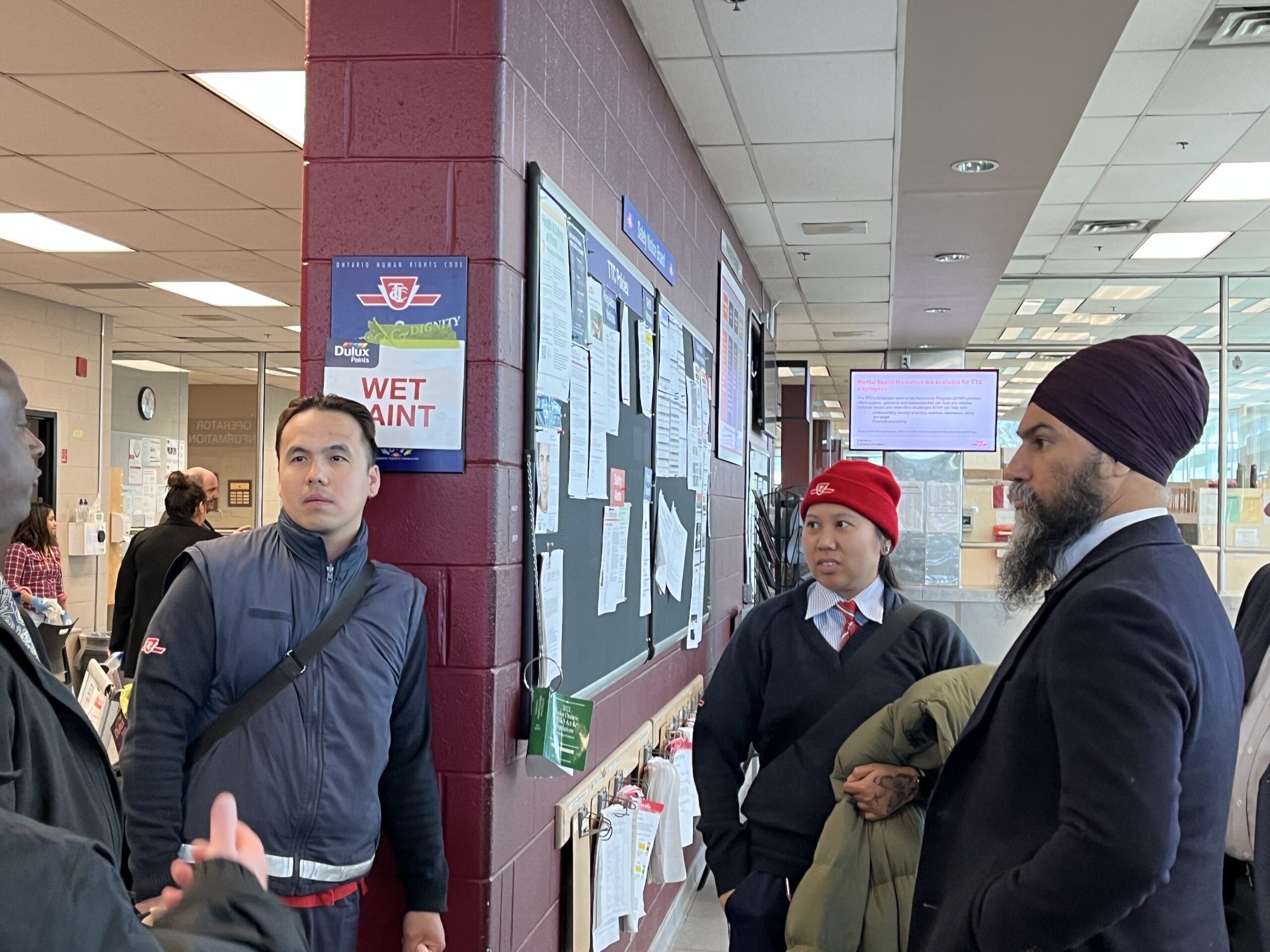


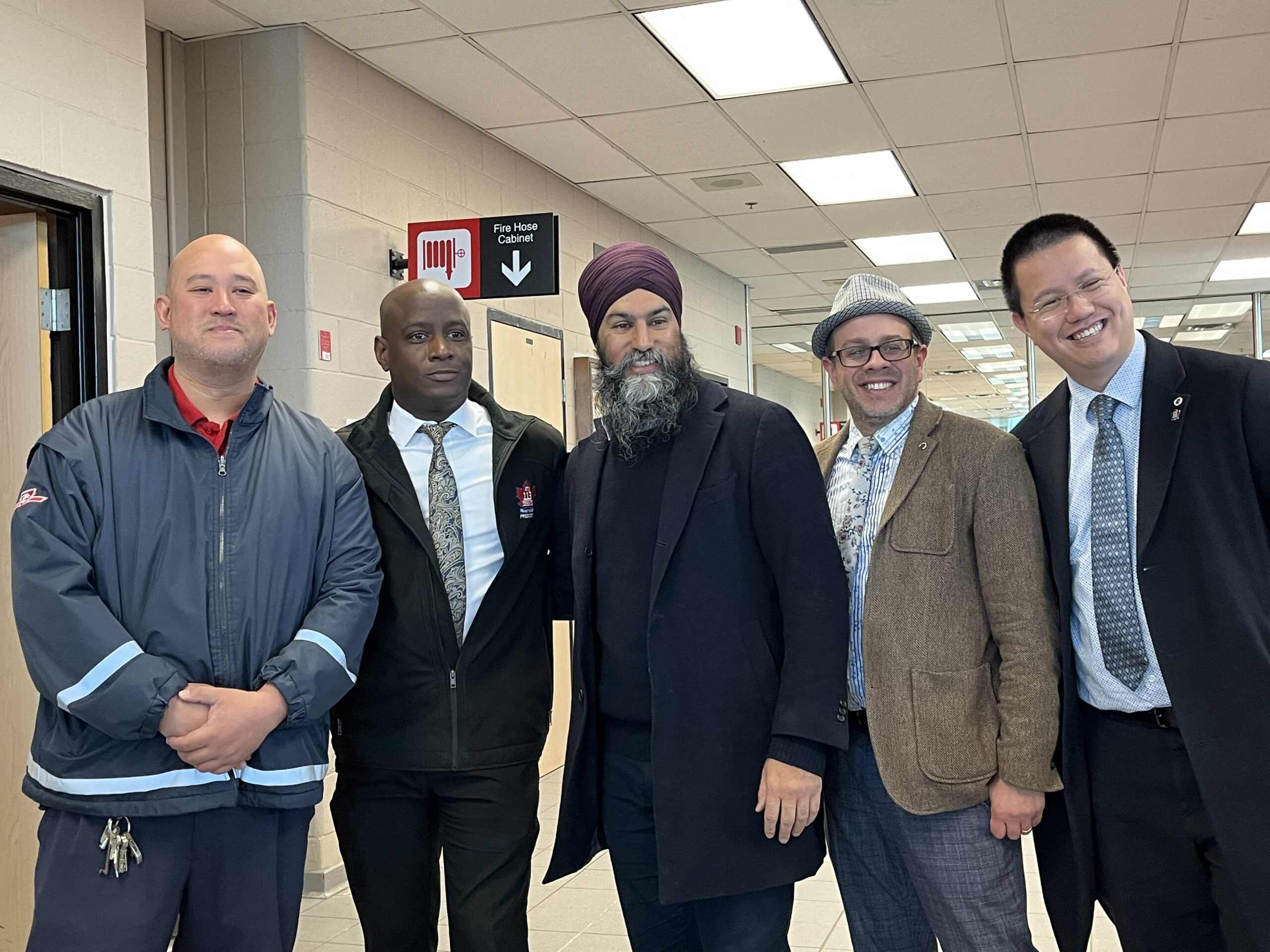

NDP Federal Leader, Jagmeet Singh Meets with ATU Local 113 Members
ATU Local 113 sincerely thanks NDP federal leader Jagmeet Singh for meeting members yesterday to hear the concerns of transit workers.
We thank our members at Eglinton Garage for highlighting the increased safety risks they face on the job, the needs for government agencies, like the police and the City, to work to better protect transit workers, and have better support for those who are underhoused, have mental health and addiction issues who take shelter in the transit system.
Members also spoke about the impact of contracting out good jobs, and the need for leadership at all levels of government to protect transit workers and the public. Our members offered insights into the need for investing in maintaining and operating Toronto’s public transit to keep our city moving.
Singh appreciated members for speaking with him and talked about his current priorities for improving public transit. He stated that public transit should not be seen as makeshift housing for those who are underhoused and that the government needs to do better to address this and other social issues. He spoke about working together with CUTA, ATU Canada and ATU Local 113 on changing laws to increase criminal sanctions against anyone who assault public transit workers, having a National Task Force to ensure public transit needs are addressed effectively, and to make work better for transit workers. 
